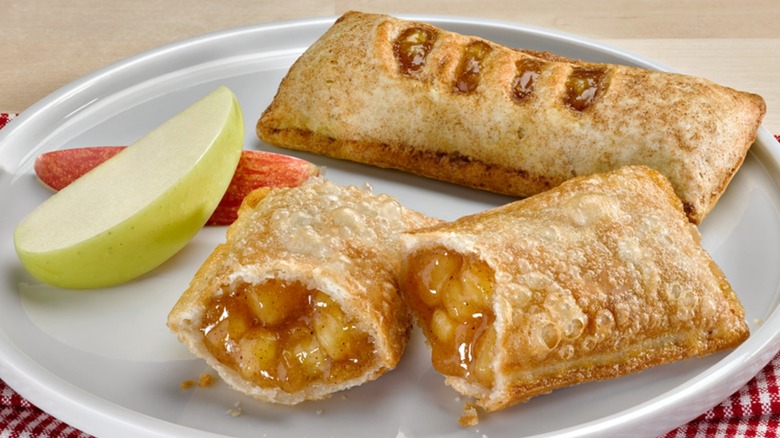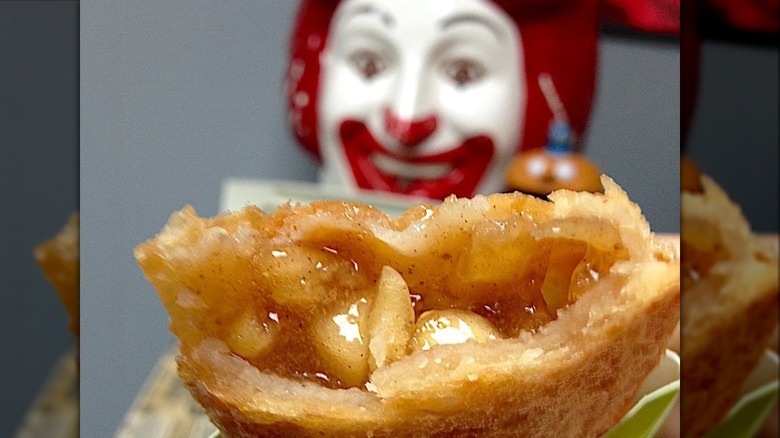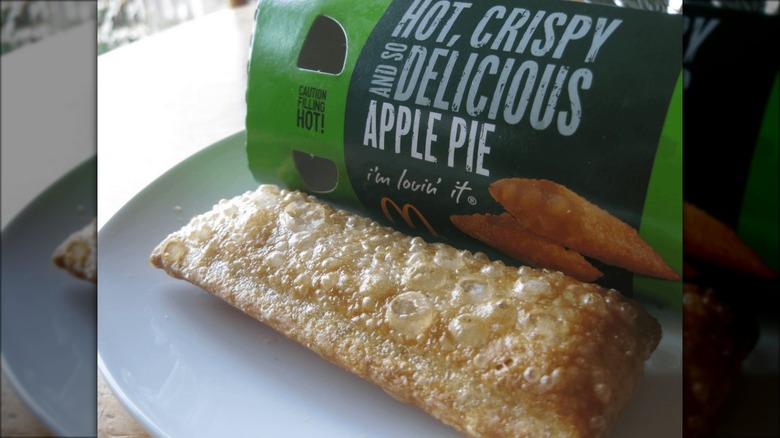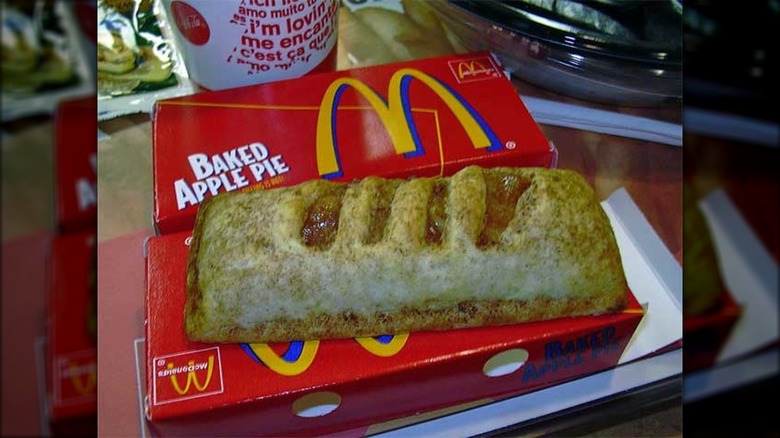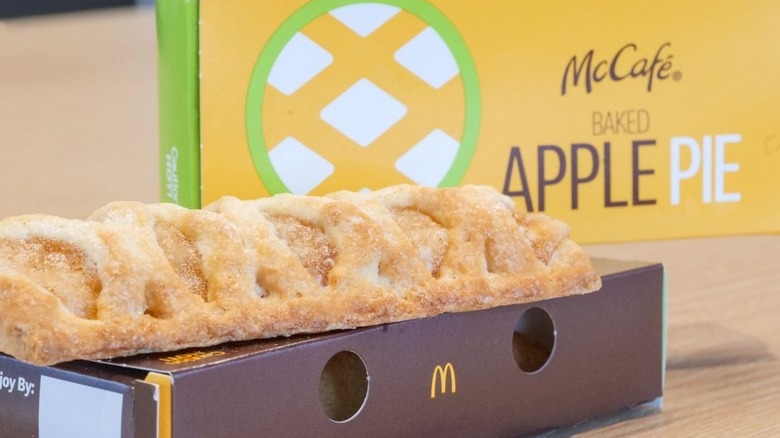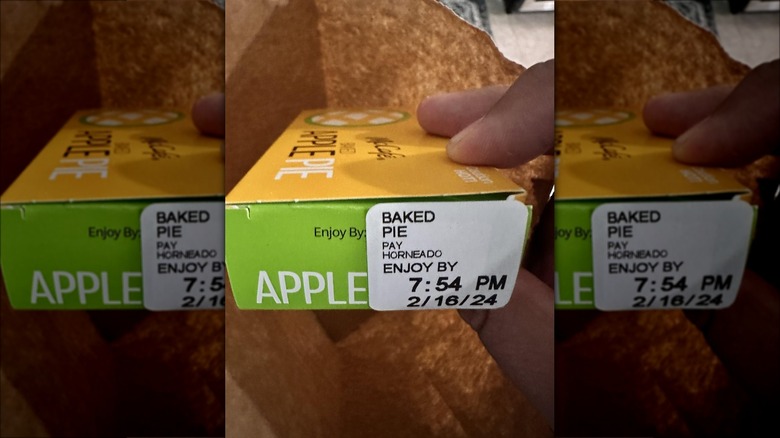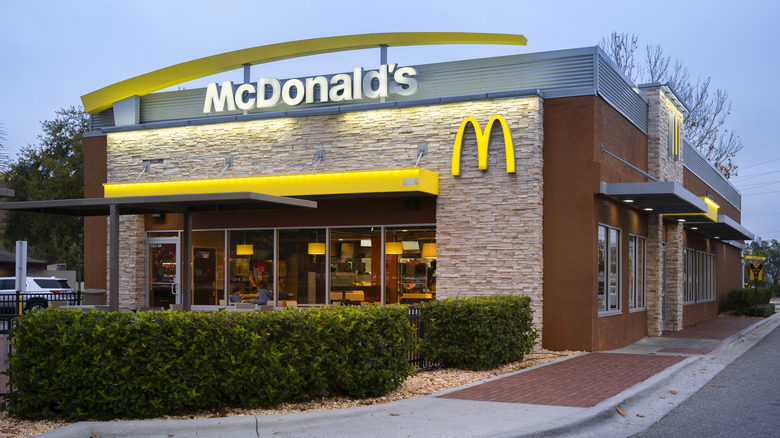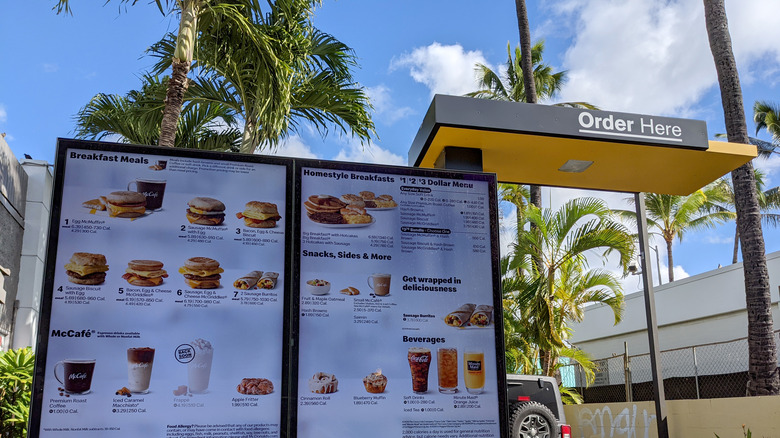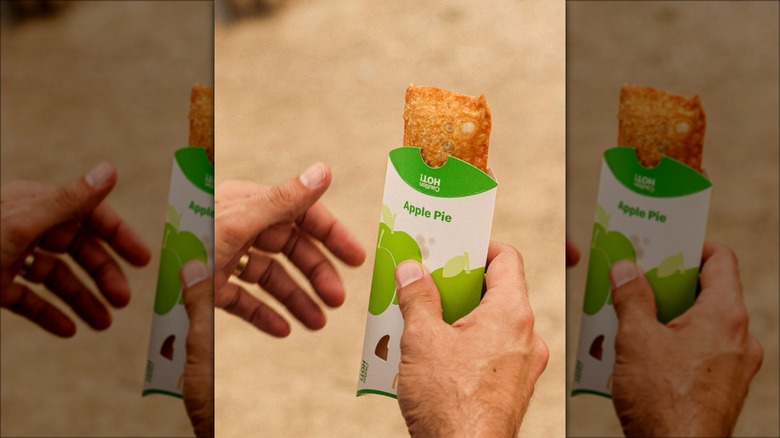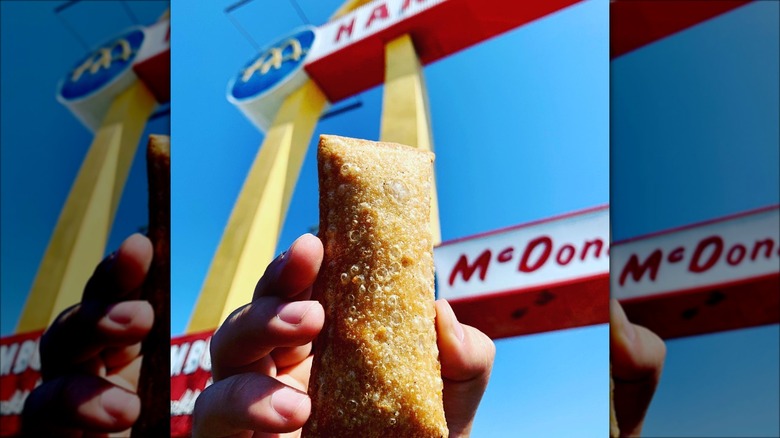What McDonald's Doesn't Want You To Know About Its Apple Pies
Of all the items on the McDonald's menu, few have caused quite as much controversy as its apple pie. First launched in 1968, the fast food chain caused outrage in 1992 when it announced plans to stop deep frying the iconic pies — instead opting to bake them. While fans still debate the true reason over 30 years later (some theorize it's because McDonald's can keep them for longer before needing to throw them away), the legacy of the deep-fried pie lives on, with customers spending the first years after its demise tracking down restaurants that hadn't yet switched to baking.
Today, McDonald's apple pie is still a popular choice for those seeking a post-burger sweet treat. But the general consensus seems to be that the baked pie tastes massively inferior to its predecessor. However, flavor is just the tip of the iceberg. There are plenty of things McDonald's would rather its customers not discuss when it comes to its apple pie. Here are 10 of the biggest secrets baked into the Golden Arches.
Apples aren't the secret ingredient
McDonald's apple pies definitely don't skimp on the apple. Each pie contains a blend of six different kinds of 100% American-grown apples: Gala, Ida Red, Golden Delicious, Jonagold, Fuji, and Rome. However, the apples aren't solely responsible for the McDonald's apple pie packing such a flavorful punch.
Previously, you could thank a powder made of dehydrated apples. This served a practical purpose, soaking up the liquid to keep the filling thick and together while it baked. Most importantly, it maximized the apple flavor. McDonald's wasn't the only company using it to this effect, with apple powder often popping up in the ingredient lists of candies, baked goods, and sugary staples such as Pop-Tarts. However, it dropped the powder in 2018 (which happens to be when a lot of fans believe the pie went downhill) and now instead enhances the flavor with citric acid, ascorbic acid, and apple juice concentrate, as well as beta-carotene to give the filling that iconic golden brown color.
Deep fried pies were sold on the black market
In the years post baked-vs-fried-gate, customers scrambled for one last hit of the flaky, searingly hot, deep-fried McDonald's apple pie. According to Los Angeles Magazine, demand was so high that there was a Fried Apple Pie Locator Map buried deep in online chatrooms at one point in the early 2000s. By 2014, there was still enough interest that one California chef found himself running a small black market fried apple pie business.
Having been tipped off at a Chicago food convention, Eric Greenspan bought up a supply of the pies from a third-party company that previously produced them for McDonald's (and still sold them to the chain's Canadian restaurants). Greenspan went on to sell them at his own restaurant, Greenspan's Grilled Cheese, where he surreptitiously marketed them on the menu as "Throwback Apple Pies" priced at $3 apiece. Sadly, Greenspan's Grilled Cheese is no longer operating as of 2017, but we remain grateful for every extra day Greenspan gave us with the OG pies.
McDonald's keeps changing the recipe
The 1992 overhaul wasn't the only major change to hit the apple pie. Blind to the concept of not messing with a good thing, McDonald's made a few minor changes in 2016 – such as switching to a lattice-top crust — before carrying out another major overhaul in 2018. This time around, the chain slashed the ingredients list to make the pies simpler and healthier, reducing the amount of artificial additives and axing the high fructose corn syrup (although you might be surprised at what other ingredients can still be found in McDonald's food).
"Our new freshly baked apple pie recipe is in line with other positive changes we have made," a McDonald's spokesperson said at the time. "Likewise, our new apple pie is made with fewer ingredients such as sugar, sliced 100-percent American grown apples and a bit of cinnamon to the filling for flavor to give each one that homemade taste our customers love."
Healthy or not, fans weren't happy that the pies were changing once again. To many, the biggest disappointments were the new pie's lack of a brown sugar-coated crust and the fact that the pie tasted too healthy to still count as an indulgent treat, with some McDonald's customers claiming on X (then known as Twitter) that "we should be rioting in the streets." Yikes.
The new pie isn't healthier than the old recipe
McDonald's has claimed they are implementing "positive changes" as a justification to transform its apple pie. The reality, however, is that the pie isn't much "healthier" today than it was pre-2018. Despite multiple outlets reporting at the time that it contains less sugar than its predecessor, the McDonald's apple pie as we know it today contains 14 grams of sugar — 1 gram more than the old pie.
The new pie also contains less fiber, with just 1 gram per pie versus 4 grams. It is fractionally better in some regards; for example, it contains 1 gram less saturated fat and 230 calories instead of 250 calories. These changes are so minor that it's hard to really justify the new pie as a truly "healthier" option. Yes, it uses real sugar instead of high fructose corn syrup, and yes, there's slightly less fat. As dietitian Amanda Li explained to National Post at the time, "The body really cannot tell the difference between the source of the sugar. For instance, when you break down high fructose corn syrup, it ends up being glucose and fructose molecules, which is the same as when you break down invert sugar or apple juice concentrate." So, in other words, don't go thinking of the post-2018 apple pie as a health food.
One ingredient comes from duck feathers
The ingredients list for the Apple Pie is shorter today than it once was, but a few ingredients still look pretty suspect. One of the most scientific-sounding ingredients is L-cysteine, a type of amino acid that's naturally produced in the body but is also used as an additive to improve the texture and extend the shelf life of various foods. (For example, the unpleasant ingredient can be found hiding in white flour tortillas.)
For McDonald's, it's listed as a "conditioner" included to improve the pliability of its dough. How exactly it secures this L-cysteine is a little alarming for those not in the know. According to The Vegetarian Resource Group, the most common source is duck feathers. It's also sometimes derived from pigs' bristles, hooves, and even human hair. With McDonald's listing its apple pies as vegan-friendly, this ingredient has caused both upset and questions within the plant-based community and sparked plenty of debate on Reddit as to whether or not the pies are okay to eat.
Not every store follows the expiration rule
When a McDonald's worker passes you an apple pie, you'll notice that a small sticker is affixed to the end with an oddly specific expiry date and time. This time is less for your benefit and more for the employees themselves, with McDonald's staff required to throw away each pie when it hits this "Enjoy By" timestamp — regardless of how many are yet to be sold.
According to McDonald's alumni on Reddit, the pies are supposed to be left out for a maximum of four hours after they come out of the oven in order to prevent bacteria growth. Several current and former employees claim that some chains will bend that rule. "Lots of stores just keep them after they supposedly expire," said one Reddit user. "They just put a new sticker [on]." Another confirmed that employees tend to be less on top of throwing out baked goods compared to menu items containing meat, but added that "you wouldn't know we're [serving] 'expired food' ... it's so full of preservatives."
Customers have sued McDonald's over the pies
Back in the 1990s, 28-year-old British customer Darren Miles sued McDonald's after biting into a pie and scalding his arm when some of the filling leaked out of the pastry. "The filling was like napalm," Miles stated at the time. "Worse than any burn I've had from soldering in my work."
While Miles may have been the first to take legal action, he definitely wasn't alone in suffering the physical consequences of a McDonald's apple pie. Delicious though they were, the deep-fried version of the pies were notoriously hot — and not the kind of hot you want from a freshly-baked good, but the kind of hot that seared your tongue if you dove into the pie too enthusiastically.
Some have theorized that it was the fear of more cases in this vein that inspired McDonald's to switch from deep-fried to baked pies. Seeing as how the U.K. is yet to follow suit 28 years later — and the incident took place four years after McDonald's ditched deep-frying in the U.S. — we'd assume that this is just an urban myth. On the plus side, at least the U.S. customers don't have to worry about their tongues meeting the same fiery fate.
The pricing can be confusing
In ye olde days of McDonald's apple pies, you could pick up two pies for $1. That's obviously not the case in the 2020s, when franchisees are free to price pies as they wish, and they cost an average of $2 each– if not on a nationwide promotion.
These promotions have caused some confusion in the past. McDonald's customers have detailed visiting stores running a "Two for $1.50" deal, only to discover that it's more expensive to purchase one pie (priced at $1.59). On other occasions, customers have gotten confused after realizing that their local McDonald's restaurant was offering one pie for $1 and two for $2.39, making it 39 cents cheaper to buy the two pies separately. It seems like these pie pricing anomalies aren't localized to the U.S., either. A customer in Sydney, Australia, previously discovered that despite being listed as $1.50 AUD, apple pies were actually charged at $2.45 AUD a pop.
Some countries still get the deep fried pies
We hate to be the bearer of bad news, but the U.S. — despite being the archetype of all things deep-fried and apple pie — is one of the few countries deprived of enjoying both together. If you travel outside of the country, you'll find hundreds of McDonald's restaurants around the world still selling the pie in all its crispy, flaky, and sugary glory.
Of the countries that sell apple pie, you can still get them fried in Mexico, Brazil, Greece, Ireland, Egypt, and Hong Kong, to name a few. The U.K. also famously serves deep-fried pies and has a slightly different — and arguably far superior – recipe to that found across the Atlantic. Its pies contain more fat and calories but less sugar. They also come in tasty (and just as deep-fried) seasonal varieties such as Hot Cross Bun come Easter, double chocolate in the summer, and a Galaxy Caramel Pie during the holiday time. Seems like the international McDonald's have quite a leg up on exceptional flavors — check out all these pie flavors you can get outside of the U.S.
A small number of U.S. locations still serve them fried
You don't necessarily need to go global to get your traditional deep-fried pie fix. You can currently find the OG McDonald's apple pie in a single restaurant in the U.S. The Downey location — situated in Southeast Los Angeles County — is the oldest active McDonald's. It's all about nostalgia, from the 1950s-style Golden Arch (yep, singular — this restaurant precedes a second arch) to the throwback contents of its menu.
Assumedly, the Downey location gets to keep what the rest of the country craves off the back of its historical status. Other restaurants that clung on to the deep-fried pies have been corrected, as was the case when a handful of Florida stores held out until the early 2010s to make the switch. However, if you're willing to look even further than Downey, you'll also find deep-fried apple pies in Hawaii (along with the coconut-filled only-available-in-Hawaii haupia pie). Franchise owner Victor Lim previously spoke to Honolulu Magazine about the apple pie's longevity in The Aloha State, explaining that they're just more locally popular than their baked counterparts. "In apple pies alone — not even counting the taro pie and haupia pie — we outsell our counterparts on the Mainland," he said. "That's the reason we've been allowed to keep our fried apple pies. Our results prove that there's a customer demand here in Hawai'i."
